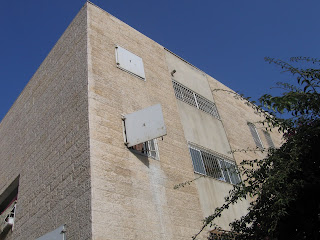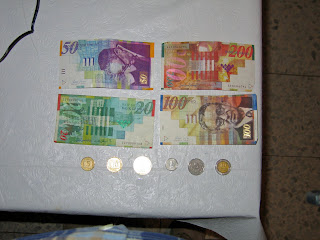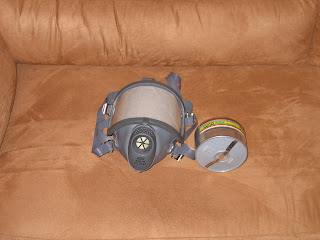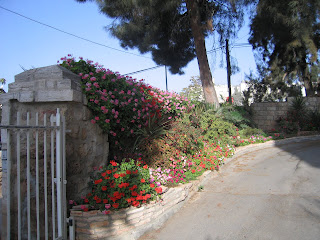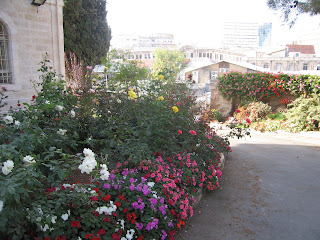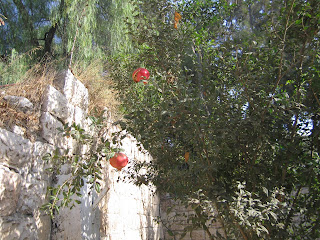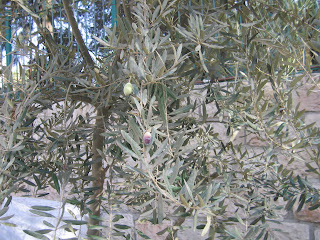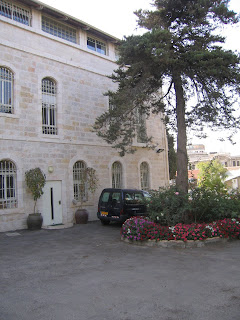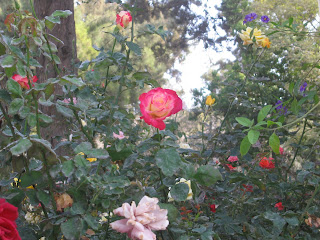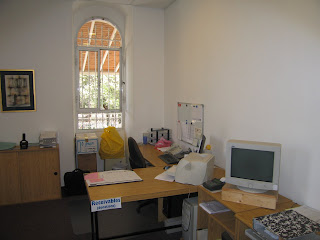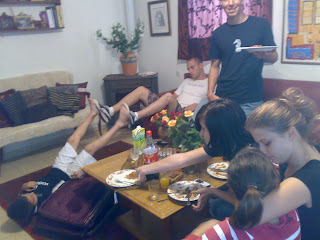
Below is yours truly standing at the grave of Mattathias (Mattiyiahu) Maccabee near Modi'in. "Get out of town." Close to where we enjoyed Shabbat was a park that said Maccabean Graves. About 160 years before the Lord Jesus, Israel (Judah and Samaria) were under the control of the Greeks. It was Antiochus Ephiphanes who thought he was god and entered the Holy of Holies in the 2nd Temple. He also was slaying pigs on the altars. See the historical book of First Maccabees, which is in the apocropha. And Mattathias cried throughout the city with a loud voice, saying, Whosoever is zealous of the law, and maintaineth the covenant, let him follow me. So he and his sons fled into the mountains, and left all that ever they had in the city (1st Maccabees 2:27-28) Eventually the Maccabees were successful and Jerusalem and the 2nd Temple were back in Jewish hands.It was the miraculous burning of the oil in the lamps during the dedication of the Temple that became the holiday today known as Hannukah, which means "dedication"."Who is like You, O LORD, among the gods? Who is like You, glorious in holiness, Fearful in praises, doing wonders? (Exodus 15:11) The Maccabean dynasty was the forerunner of the Hasmonean Dynasty that was present during the time of the Lord Jesus. Even then Hannukah was remembered then as it is today. Now it was the Feast of Dedication in Jerusalem, and it was winter. And Jesus walked in the temple, in Solomon’s porch. (John 10:22-23)
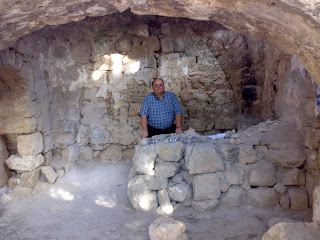
Below the closing of congregation this particular Shabbat was with the Aaronic blessing performed by a dance troup. "The LORD bless you and keep you; The LORD make His face shine upon you, And be gracious to you; The LORD lift up His countenance upon you, And give you peace." (Numbers 6:24-26)
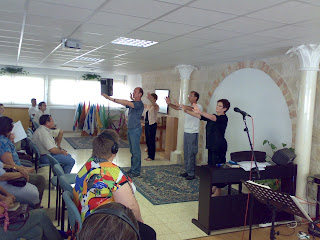
Below is the lift (elevator) in my apartment building. It is a little bit bigger than a phone booth.
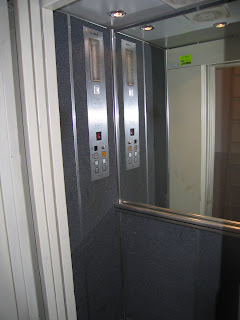
The stairwells in the building where I currently live are dark all the time in order to save electricity. Below is a picture of my next door neighbor that shows one button for a door bell and another button for turning the lights on. All the apartments are designed this way. The problem is when you turn the lights on, they only stay on for a few seconds to allow you enough time to get down one floor. Then you press another "light" button and keep going down, etc. For my granddaughter, Abbie, who is 7 going on 8, she would think this is a lot of fun. For grandpa Cary, an old man with gimpy knees, it's more of a challenge. I hit the light switch just outside my apartment then "giddy up, go" and hobble down the stairs to the next floor before the lights go out. Once in all my excitement, I hit the doorbell of an apartment. Since it was about to go dark, there was no time to stop and chat so I kept on going and just hollered "sorry". He spoke English and said "that's ok" sort of like it happens all the time. Sometimes it is easier to ride in the phone booth.

Below the apartment on the first floor has the same red button as I do for heating the hot water. When I went to press it, I was not sure if the lights were going to come on or I was going to heat their hot water. However, the lights did come on so these buttons must be interchangeable to the maintenance personnel. In Israel there is a Va'ad Tax (Maintenance) that all renters must pay monthly in shekels.
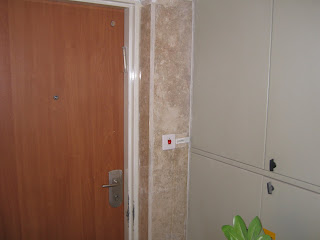
Below is a picture of my bomb shelter bedroom window (closed on the top floor). My neighbors below have theirs open.
My "bs" bedroom window from the sidewalk.

Below looking out my bomb shelter bedroom window at Derekh Hebron (Hebron Road).

Below if you zoom in on the photo, you might be able to make out a typical street sign in Hebrew, Arabic, and English. This one says Arnona (a neighborhood); Old City; and Center meaning the City Center. It would have been easier to take the picture up closer.

Below looking out my bomb shelter bedroom window at Derekh Hebron (Hebron Road).

Below if you zoom in on the photo, you might be able to make out a typical street sign in Hebrew, Arabic, and English. This one says Arnona (a neighborhood); Old City; and Center meaning the City Center. It would have been easier to take the picture up closer.
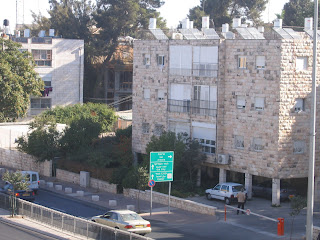
Below is a typical Israeli bus. Many are double-connected in length (twice as long). Some are air conditioned. Some are not. All our usually crowded. A gentleman always gives up his seat for a lady, so I usually stand during the bus trips holding on tightly when the driver makes several 90 degree turns. People shop and bring their packages and groceries on the bus. Young mothers are the only ones permitted to board at the back of the bus because they usually have a baby carriage. On one particularly crowded bus we were already standing in the doorways when a young mother wanted to get on board with her baby carriage and a precious little girl about 1 year old. Well, there's always room for one more so you just squeeze a little closer and we were able to get her aboard. Then, of course, the very next stop, someone about 5 or 6 people back needed to get off stepping past 2 baby carriages when none of us could move. An Israeli had the correct answer. At the back of the bus he jumped off temporarily and then jumped back on. That's tricky to do since the bus driver is assuming you wanted off and he's ready to go. The Israeli bus drivers do a wonderful job. It's constant shoving and pushing and going on to the next stop as fast as possible. Besides, you want to be nice to the bus drivers or during rainy season they will leave you 3 feet from the curb and you will get your feet wet when getting off the bus.
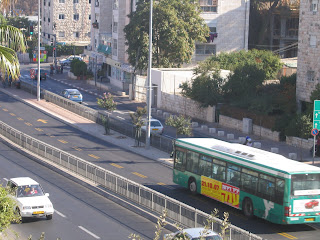
Below tour buses are the best. The Arab buses are smaller and white but have the same numbers. No Jews get on the Arab buses but Arabs do get on the Israeli buses. There are no set schedules. The buses just come every 15-20 minutes. The trick is knowing which bus to get on. Currently I can catch either 21 or 30. Word of mouth is the best way to learn. When you approach the bus stop if there are a lot of people there chances are the bus will be there sooner. If the bus stop is empty, you just missed it.
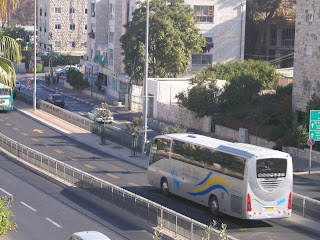
Below if you zoom in on the sign, you will see "Caution! Vehicles From Both Sides". Derekh Hebron in front of my apartment is 6 lanes. The two closest lanes are one way going south, the two furthest lanes are one way going north, and the two middle lanes go both directions. Hence the warning sign in Hebrew, Arabic, and English.
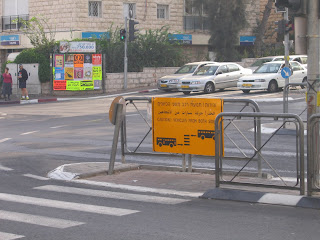
Below is my closest bus stop in the middle of the Derekh Hebron. Zooming in you can see a "little green man walking" telling the pedistrians it's ok to cross. Otherwise, you see a "little red man standing still". Some of the streets in Jerusalem only allow you to cross halfway to the median then continue on. Crossing Derekh Hebron there are 3 separate "walk" or "don't walk" signs. When the light does turn green you have to hurry. It only stays green about the same amount of time as the lights in the stairwell. You have to hustle across the road. The gentleman below with a cane is fulfilling prophecy: "Thus says the LORD of hosts: ‘Old men and old women shall again sit in the streets of Jerusalem, Each one with his staff in his hand because of great age. (Zechariah 8:4)
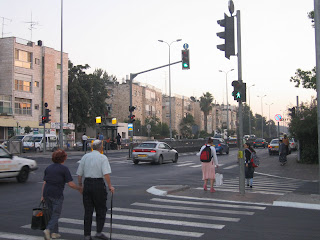
Below is the local market where I get my groceries. Don't buy too much in one trip since you have to walk 4-5 blocks to the apartment.
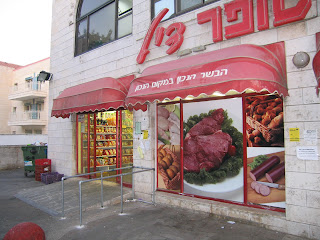
Below, if you zoom in, are Israeli shekels. The flash was a little too bright. The paper notes are 200, 100, 50, and 20. The coins from right to left are 10, 5, 1 shekel, 1/2 shekel, 10 agarot, and a 5 agarot. It takes 10 agarot to make a shekel. Usually no one wants the agarots including the beggars on the street. The current ratio is roughly 1 US dollar equals 4 shekels. At the airport I paid 8 shekels for a coke so it cost me $2.
